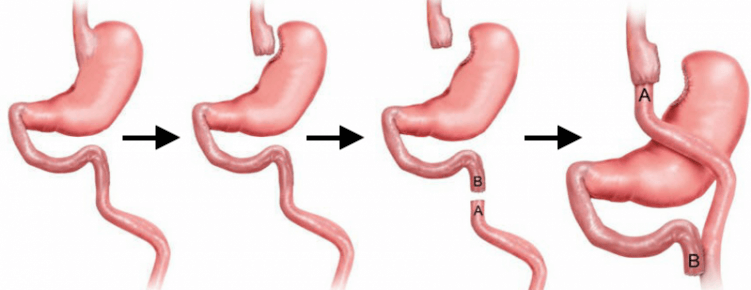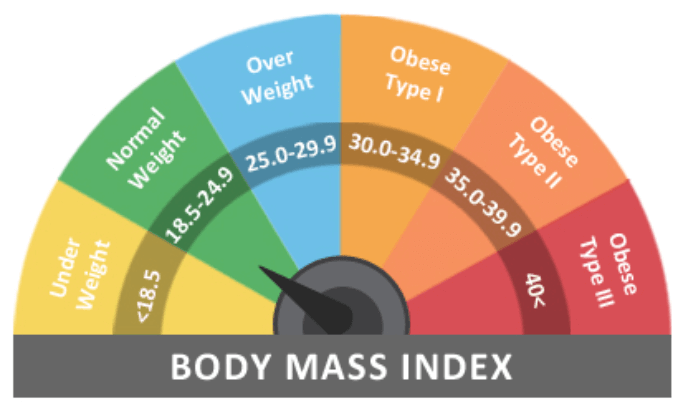The Most Efficient Way to Reduce Your Excess Body Weight Up to 80% – A Comprehensible Guide On Gastric Bypass
Being overweight and obese inevitably has a significant impact on your life and on the lives of people around you. You’ve probably repeatedly found yourself thinking about:
- Things that haven’t been done due to poor health and being out of shape;
- Or things that have become extremely frustrating.
And unfortunately, this list is long.
Maybe you want to get married, but being overweight hasn’t given you the chance to wear the wedding dress of your dreams…
Maybe you’ve wanted to travel the world more, but tight airplane seats and interior makes traveling extremely uncomfortable for yourself and others…
Maybe you’ve wanted to wear your favorite clothes that you bought a long time ago, but you still haven’t been able to wear them because they don’t fit you anymore or you wouldn’t feel confident in them at all…
Or it’s just that you want stairs or lacing up your shoelaces to be no longer a nightmare, but something you can do with ease.
This list can go on and on. Sounds familiar?
Whether or not your wish was on this list, there is a much faster, safer, and more effective way to start chasing it than starting another fancy-named diet or going to the gym a few times to give it up again next week because of the absence of quick results.
And the much faster and efficient way to achieve those fore-mentioned goals is the gastric bypass surgery, also known as Roux-de-Y.
Behind The Scenes of the Gastric Bypass
Roux-de-Y gastric bypass surgery is considered as the golden standard for weight-loss surgeries. Although there are different types of bariatric surgeries, according to studies and experience, this type of weight-loss surgery has proven to be the most effective.
As a result of gastric bypass surgery, patients have experienced a 10-17% greater weight loss (1) over a 4-year period compared to some other bariatric surgeries, such as adjustable gastric banding, or sleeve gastrectomy. Therefore, it’s also the most popular bariatric surgery.
Gastric bypass surgery is performed under general anesthesia and it can be done in two different ways:
- Using a traditional method, where during the open surgery, the abdominal cavity is opened with a cut of 15-30 cm;
- Using the laparoscopic method, in which special instruments are inserted into the abdominal cavity through small openings and the process is viewed with a thin telescopic instrument (the common method).
During the operation, the upper tiny part is removed from your stomach by stapling or with a vertical band, forming a stomach pouch with a capacity of about 30 ml (i.e. your new stomach) attached to your esophagus. A small intestine, which would regularly “come” after the stomach itself, is attached to the new, formed stomach. As a result of this procedure, food is going to move past the stomach and duodenum.
However, if this brief explanation was a bit confusing for you (which is totally fine!), the following figure definitely helps to visualize the previous story a lot better.

And that’s how simple (or yet complicated?) it is.
Here are some other essential features about gastric bypass you should be aware of:
- Duration of the surgery: 1-3 h (usually approx. 1.5 h)
- Hospital stay: 2-4 days
- Potential weight loss: 70-80% of excess body weight
- Gastric bypass surgery is reversible (!)
- Sick leave: 2 weeks
- Anesthesia: General anesthesia
Also keep in mind that in order to be fully prepared for this new, life-changing journey, you need to start following personal nutrition and exercise plans given by the clinical nutritionist already weeks before the operation itself.
A Remarkably Easier Life Becomes Your New Reality
Now that the surgery is successfully completed, the real weight loss journey only begins. That means it also requires you to be determined and committed. However, you can count on the facts that as a result of gastric bypass surgery and your own contribution:
- Your life expectancy is significantly longer (2) and the quality of your life is a lot better (hell yeah!);
- Your new stomach holds much smaller amounts of food, which reduces the number of calories consumed. Fewer calories consumed = greater weight-loss;
- Redirecting the food stream causes changes in gut hormones, which:
- Promotes a feeling of fullness;
- Suppresses hunger.
- The potential loss of excess weight is 70-80% (!);
- Your self-esteem is higher and you are far more confident in everything you do.
To calculate your potential 1-2 year weight loss based on your current weight, you can use this simple formula:
(current weight – ideal weight) x e.g. 70% = potential weight loss
EXAMPLE. The patient weighs 140 kg before surgery and is 178 cm tall. However, their ideal weight at a weight index of 25 kg / m2 is 80 kg. So the calculation should look like this:
(140 – 80) x 70% = 42 kg
In other words, as an average patient, their weight loss after the surgery (assuming that the patient has also followed the nutrition and exercise plans properly) is expected to be 42 kg. It means that their new weight should be 140 kg – 42 kg = 98 kg. (Instead of 70%, you can use 80% or a lower percentage in the formula – think what could be the result you would be able to achieve.)
Gastric bypass also provides a solution to a number of diseases that tend to affect obese people the most:
- Type II diabetes,
- Ischemic heart disease,
- Hypertension (high blood pressure),
- Sleep apnoea (temporary suspension of breathing occurring during sleep),
- Joint diseases,
- High cholesterol;
- A condition following a heart attack or stroke,
- Polycystic ovary syndrome.
So if even one of these diseases or health conditions prevents you from living and enjoying your life to the fullest, gastric bypass might be the “magic pill” you need.
Potential Risks to Consider with Gastric Bypass
As mentioned before, the gastric bypass is the golden standard for weight-loss surgeries. But in addition to the significant positive features, there are still some inconveniences and risks to consider as well:
- Due to nutrient and vitamin deficiencies, supplements and vitamins must be taken daily (especially vitamins D and B12, iron, calcium, and other trace elements).
- Dumping syndrome (3) – often when eating sweet or high-fat foods (especially when eating and drinking at the same time), food can rush through the small intestine too quickly, drawing fluid with it. It can cause nausea, diarrhea, dizziness, and cramping pain. However, this syndrome occurs in only 10% of patients.
- Eating large amounts or eating fast can lead to nausea, abdominal pain, and vomiting.
- Because it is a more technically complex operation, postoperative bleeding and ulcers may occur.
- The risk of major complications is low (approx. 2%).
- Surgery-related mortality is also low (approx. 0.13%).
You can find out more about possible major and minor complications for example from the guide made by the Bariatric and Metabolic Institute of Cleveland Clinic.
Your Fridge Will Also Go Through an Extensive Makeover
Unfortunately, the completion of the gastric bypass doesn’t mean that you can eat everything you want right after the operation.
In the first weeks, the recovery diet is based on liquids, purees, and other soft foods. All of this is necessary to let your stomach recover as painlessly and smoothly as possible and your body has time to adapt to new and healthy eating habits.
So you have to wait a bit before you can move back to the regular food. Initially, your menu will include soups, broths, and juices, which will be gradually followed by pureed foods. It’s important that the food doesn’t contain pieces that could put a strain on the “freshly tuned” digestive tract.
After a few weeks, you can move on to softer foods, such as boiled vegetables, scrambled eggs, soft and juicy lean meat, porridges, etc. It takes about three months to reach solid food.
You can definitely get a thorough overview of both the potential menu and exercise habits for example from the Healthline’s article “Your Guide to the Gastric Bypass Diet”, but the final menu and training plan will be created personally according to your body, habits, and lifestyle during a consultation with a specialist.
It’s also worth noting that carbonated drinks, especially alcoholic beverages, are not allowed after the surgery. Alcohol is high in calories but provides your body with a minimal amount of valuable nutrients. To put it into context, basically, it’s like pouring soda into the car’s gas tank – it takes up space, but it’s useless.
However, according to studies, because of the new digestive system, alcohol is no longer so much in contact with the parts of the digestive tract that were previously involved in the absorption of alcohol.
This leads to a situation where alcohol stays longer in your body, getting sober takes longer too and the risk of becoming dependent on alcohol increases, which also leads one step closer to depression and other physical and mental disorders.
Is Gastric Bypass the Right Fit for You?
Roux-en-Y gastric bypass can be the starting point for your healthier life if you are obese (not overweight!) or if you have an obesity-related illness (such as diabetes, sleep apnea, hypertension, arthritis, etc.) that would ease or even disappear after the weight-loss surgery.
People are often confused about being overweight and obese, so if you have a beer belly from barbecue nights or some nice jeans you bought some time ago, don’t fit you anymore, you have no reason to rush to a weight surgeon right away.
Bariatric surgery (including gastric bypass) should be considered with a body mass index (BMI) of 30 kg / m2 or more. In order to determine your body mass index and thus make sure that this surgery is suitable for you, you can take a quick test now.
If you already know your numbers, take a look at this chart and ascertain, to which category you’d belong to with your result:

Obesity-related diseases should also be taken into account when assessing the suitability of the gastric bypass surgery. For example, if your BMI is 31, but you suffer from high blood pressure, it would be wise to consider the surgery. But if you don’t have any diseases, the surgery might not be necessary. Yet.
However, if your BMI has reached 40 or more, it is vital to consult a doctor and find the best possible weight-loss surgery for you.
Another intriguing fact is that gastric bypass is almost two times a safer way to lose weight compared to simply modifying your lifestyle with a rapid and intense change.
According to a recent study in Sweden (4), involving 40,000 patients, obese people who tried to lose weight independently by drastically changing their lifestyle and eating and exercise habits instead of going for the surgery, had a higher risk of heart failure.
The weight loss results of the same study can’t be ignored either. Patients who underwent gastric bypass surgery experienced around 20 kg greater weight loss over the first few years than their “competitors”.
You Have Already Paid the Highest Price
Before getting to the numbers, how much a weight-loss surgery could cost, it’s worth reminding that regardless of the price of the surgery, the highest price has already been paid – it’s your health.
Although no price tags are attached to people, the fact is that the most precious asset a human can have is their health. When health is poor, absolutely all other areas of life suffer as well. I bet you know what I mean.
Because the highest price has already been paid in the form of health problems, limitations, unfulfilled dreams, and inconvenient situations, it is a much cheaper way to help improve your life quality through gastric bypass surgery.
The good news is that even though the quality of medicine in Estonia is on the same top-notch level as in other top clinics in the world, you don’t have to pay $10,000 to $25,000 to our partners in Estonia as it is common in other European countries or in the United States.
We guarantee you top quality and the best pre- and post-operative service for only 5,950€ (around $6,500). In addition to the tens of thousands of dollars saved, the best part of it is that this amount covers literally everything: all the consultations, surgery itself, transportation between airport/hotel and the hospital, tests, instructions for the post-surgery period, support via e-mail and phone for 5 years after surgery, and so much more.
One Little “But”…
Even though gastric bypass is indeed a very effective weight-loss surgery, it’s unfortunately not enough for complete results – the greatest contribution and effort is required from you.
You’ve probably noticed that if you order an expensive training and nutrition plan, but never go to the gym and continue on the paths of old eating habits, your weight will not fall in any way. Therefore, it’s extremely important that you are ready to actively strive for a better life and health after the surgery, too.
However, it’s not that rare at all – in fact in about 50% of patients – that a person who has undergone surgery gains the weight back in a few years, but usually for about 5% of it. The good news is this weight gain can also be avoided by not slacking the diet and lifestyle plans set by your surgeons and following the guidelines in an excellent manner.
So before making that decision, you have to both figuratively and literally look in the mirror and think, am I truly ready for this journey to a better, easier, and happier life.
No extraordinary achievement in this world has been born by sitting on the sidelines – you have to take control into your own hands. I know you’re 100% capable of that.
The Most Important Question
Now that you’ve got a clearer picture of what a gastric bypass surgery is, what are the good (or not so good) things about it, you’ve probably come to the conclusion in your head whether or not it might be something for you.
Probably if you’ve read this far, your life has become much more complicated due to your overweight than you might have imagined a few years ago.
If you were asked what haven’t you been able to do in your life due to your current weight and health, I believe that the list can be quite long. Maybe you already have some frightful situations and unfulfilled dreams in your mind at the moment. I know – this feeling is not pleasant.
As we have helped hundreds of obese people to a better and happier life with our team, I’m sure your success story will be at least as amazing. We are ready to use our best knowledge and skills to make your journey to an easier and happier life as smooth as possible.
So, to turn your dream into reality, I have one last question – when will we meet?
P.S. Be sure to take a look at the testimonials of people, just like you, who have already had their successful surgeries – it’s a truly inspirational and heart-warming reading.
Sources
Maciejewski, M. L., Arterburn, D. E., Scoyoc, L. V., Smith, V. A., Yancy, W. S., Weidenbacher, H. J., … Olsen, M. K. (2016). Bariatric Surgery and Long-term Durability of Weight Loss. JAMA Surgery, 151(11), 1046. doi: 10.1001/jamasurg.2016.2317
Schauer, D. P., Arterburn, D. E., Livingston, E. H., Coleman, K. J., Sidney, S., Fisher, D., OʼConnor, P., Fischer, D., & Eckman, M. H. (2015). Impact of bariatric surgery on life expectancy in severely obese patients with diabetes: a decision analysis. Annals of surgery, 261(5), 914–919. https://doi.org/10.1097/SLA.0000000000000907
Ukleja, A. (2005). Dumping Syndrome: Pathophysiology and Treatment. Nutrition in Clinical Practice, 20(5), 517–525. doi: 10.1177/0115426505020005517
Sundström, J., Bruze, G., Ottosson, J., Marcus, C., Näslund, I., & Neovius, M. (2017). Weight Loss and Heart Failure. Circulation, 135(17), 1577–1585. doi: 10.1161/circulationaha.116.025629












